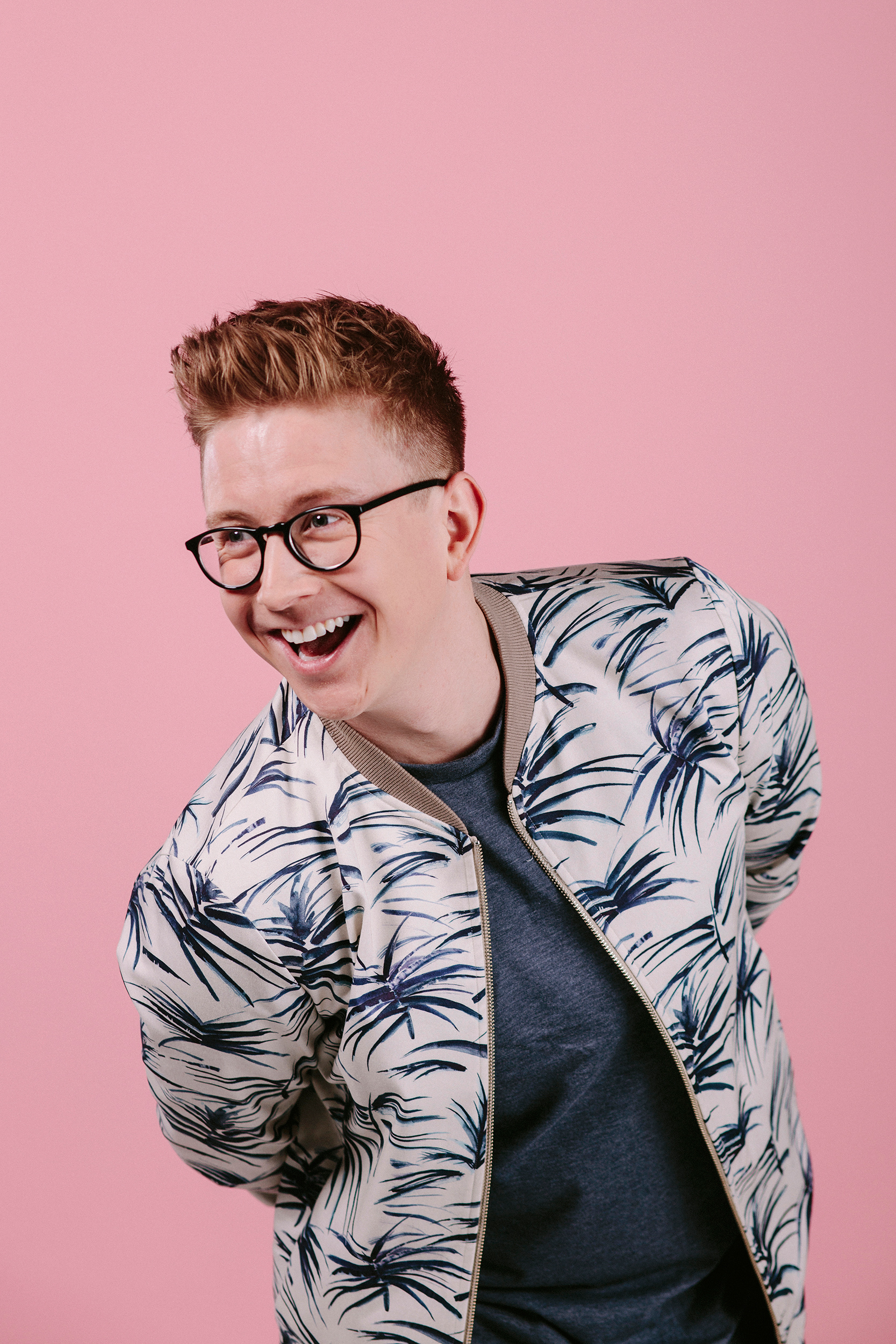Tyler Oakley puts 60 seconds on the clock. The 27-year-old has just challenged actor Zooey Deschanel to a game of “Compliment Wars” for an episode of his web series, The Tyler Oakley Show. As pictures of celebrities flash on the screen, they race to say as many nice things about them as they possibly can. Among simple options like Beyoncé (“so beautiful”) and Taylor Swift (“country princess”) comes a more divisive figure: President Trump. Yet it takes Oakley only a moment. “You have such luxurious, fluffy hair,” he says. A bell dings. It counts.
At a time when rifts seem like they might swallow humanity whole, the playful positivity that defines Oakley’s brand—not just on The Tyler Oakley Show, but across his YouTube channel, Twitter account, best-selling memoir, live shows and more—seems not just pleasant but necessary, especially for the millions of fans who have found an idol in the openly gay entertainer since he posted his first YouTube video a decade ago.
TIME spoke to Oakley about online trolls, sexuality and the power of just being oneself, out loud and in public.

The Internet can be a dark place. Trolling. Bullying. What do you think the worst things about it are?
The worst things about the Internet are also the worst things about real life. Those people that are trolls and those people that are negative online, the Internet didn’t start that. Those people have always existed. I think the opportunity to be a little bit more anonymous has given them a bit of freedom to express themselves. But on the flip side, the community aspect of the Internet has given people those safe havens and those safe spaces to feel connected and to feel validated in their identities.
Is that the best thing about the Internet?
I think about when I was little, I couldn’t Google ‘coming out story.’ Now you can Google ‘coming out story’ and find tens of thousands of stories. So while there might be trolls spreading negativity, I think representation is the best thing that has come out of the Internet.
At this point, how does sexuality factor into your public persona—is it a crucial part or do people focus on it too much?
That’s a discussion at lot of people in the LGBT+ community have: is this your whole identity? And a lot of times people say, Oh, it’s just a small part of me. But who I am as a whole is constructed by the parts, and my decisions and my experiences are based on who I am. So although my sexuality is just a part of who I am, it affects how I see the world and how I approach the world … especially in a world where you can be killed for being gay or be fired for being gay.
And there must be followers who have felt your sexuality is meaningful for them, just you being who you are in public.
That has been one of the best surprises of being on the Internet. I started when I was 18, like just some self-centered little twerp making videos about nothing. But at the same time, I didn’t know who was watching and I remember when I first started getting messages from kids being like, Hi, I’m from some Middle America town where they know no gay people. And they would talk about how me just being me could help them and felt like an escape for them. That was never the intention, but as soon as I started getting that, I was like, holy f—. This is bigger than I ever thought, and not heavier, but more of an opportunity to do good.
The list of platforms you have used at this point is long. Reality TV. Live shows. A memoir. Podcasts. But many involve being a host of something. What makes someone a good host?
I would say being able to listen, being able to not take themselves too seriously. I think the whole reason for any type of success I have had is I just want to have fun, and I don’t mind looking like an idiot. I think people gravitate toward that. Nobody wants to see somebody who thinks that they’re so serious. People just want to have a little bit of frivolous fun and also a point of view and a perspective. Especially within the last year, I have gravitated most to creators who stand up for what they believe in.
How would you describe your message to the world?
Dare to be you. That is exactly what I want people to get from me, especially now, when exclusion is a part of what’s going on in the world and, I think, a form of oppression. I think representation and putting yourself out there and being open and honest and authentic about who you are, that’s a form of resistance.
- Donald Trump Is TIME's 2024 Person of the Year
- Why We Chose Trump as Person of the Year
- Is Intermittent Fasting Good or Bad for You?
- The 100 Must-Read Books of 2024
- The 20 Best Christmas TV Episodes
- Column: If Optimism Feels Ridiculous Now, Try Hope
- The Future of Climate Action Is Trade Policy
- Merle Bombardieri Is Helping People Make the Baby Decision